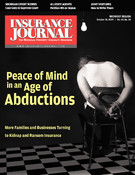While insurers generally see the use of credit scores as both fair and valid, not all independent agents concur.
Two lawsuits of interest to the insurance industry have generated media attention in recent weeks. Only one was being tried in the Midwest but both have the potential to affect business of insurance not only in the Midwest region, but nationally as well.
The Midwest case involves the use of credit scores in setting rates for personal lines of insurance and is currently being considered in Michigan, one of a handful of states that places prohibitions on the use of insurance scoring. Rules promulgated by the Michigan Office of Financial and Insurance Regulation (OFIR) in 2005 curtailing insurers’ use of credit scores were challenged by the insurance industry and the case is finally before the Michigan Supreme Court. (See page 10.)
The industry maintains that the case is not about the use of credit scores per se, rather the lawsuit challenges whether state insurance regulators overstepped their authority in promulgating such rules. But if the state Supreme Court finds the rules to be valid and enforceable, the decision may open the door to re-evaluation of the issue in other states where it was thought to have been put to rest.
While insurers generally see the use of credit scores as both fair and valid, not all independent agents concur. The OFIR has noted that in hearings on the proposed rule some agents spoke against using credit scores in insurance rate setting, and stories posted about the case on the Insurance Journal Web site, www.insurancejournal.com, have generated many comments both for and against their use.
The second lawsuit, which has made its way through the Mississippi state court system, involves San Antonio-based United Services Automobile Association and addresses wind-versus-water issues that arose after Hurricane Katrina in 2005. In a 9-0 decision, the Mississippi Supreme Court recently ruled that so-called “all-risk” home insurance policies may cover wind damage from hurricanes, even in situations where the loss is later exacerbated by water from storm surge. Some insurers had argued that such damage is excluded by anti-concurrent cause (ACC) and other language in their policies.
As Insurance Journal’s Andrew Simpson has reported, the Mississippi high court found that a policy may exclude storm damage when it is caused by a combination of wind and water acting together. But if wind and water damage can be distinguished, this exclusion does not apply. USAA has said that the decision actually affirms their policies and confirms that storm surge is not covered. Others see the decision as a potential crack in ACC exclusions that will force insurers to establish causation if they seek to exclude coverage.
At first glance wind-versus-water issues may not seem applicable to the Midwest, but given the magnitude of losses in the region from both wind and water in recent years, it may be worthwhile to take notice of future developments in this area.
It will be interesting to see what effect, if any, the decisions in these two cases have on the business of insurance in the Midwest.
Topics Michigan Mississippi
Was this article valuable?
Here are more articles you may enjoy.


 Trump Demands $1 Billion From Harvard as Prolonged Standoff Appears to Deepen
Trump Demands $1 Billion From Harvard as Prolonged Standoff Appears to Deepen  Insurify Starts App With ChatGPT to Allow Consumers to Shop for Insurance
Insurify Starts App With ChatGPT to Allow Consumers to Shop for Insurance  US Appeals Court Rejects Challenge to Trump’s Efforts to Ban DEI
US Appeals Court Rejects Challenge to Trump’s Efforts to Ban DEI  A 10-Year Wait for Autonomous Vehicles to Impact Insurers, Says Fitch
A 10-Year Wait for Autonomous Vehicles to Impact Insurers, Says Fitch 


